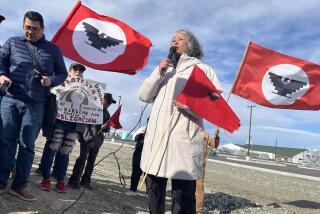Defense Cost Freeze Asked by AFL-CIO
- Share via
BAL HARBOUR, Fla. — The AFL-CIO executive council today called for a freeze in defense spending, a move that the labor federation’s president says is necessary so low- and middle-income Americans won’t be denied federal services.
“The AFL-CIO remains committed to a strong defense,” said AFL-CIO President Lane Kirkland, reflecting the position adopted by the 35-member executive council. “But we are equally committed to a strong economy and social justice at home.
“We will . . . not support increased defense spending at the expense of programs that are vital to our domestic welfare,” he said, adding that the freeze must be instituted to stop denying “needed federal services to middle- and low-income Americans who pay the major share of federal taxes.”
Mondale Meeting
Kirkland spoke today at the second day of the council’s annual winter meeting. On Monday, former Vice President Walter F. Mondale met with the council.
“(President Reagan) has foreclosed all options that would lead to a fair and equitable financing of our military needs,” Kirkland said. “If vital domestic programs are to be cut or frozen, defense spending must also be frozen. We refuse to make a choice between the ‘general welfare’ and ‘the common defense.’ ”
Earlier in the day, Sen. Bob Packwood (R-Ore.) sought the AFL-CIO’s help to defeat the Administration’s proposal to tax employee benefits.
Packwood, chairman of the Senate Finance Committee, said he received assurances from the council that the AFL-CIO will try to sideline the employee benefits proposal in the House.
‘Lean Hard on the House’
If the proposal loses in the Democrat-controlled House, “it will not be added in the Senate,” Packwood said. “I need them to lean hard on the House.
“On the taxation of employee benefits I said this is going to be the biggest fight we’re going to face this year and I desperately need their help, the unions’ help, to win it,” he added.
Packwood said he opposes the plan because “I think we are much better served by a whole panoply of health insurance, legal insurance, day care, all of these employee benefits being provided by the employers in conjunction with the unions than we are (with) the government doing this.” The government, he said, will end up doing it “if it is not done through these joint plans.”
More to Read
Inside the business of entertainment
The Wide Shot brings you news, analysis and insights on everything from streaming wars to production — and what it all means for the future.
You may occasionally receive promotional content from the Los Angeles Times.









